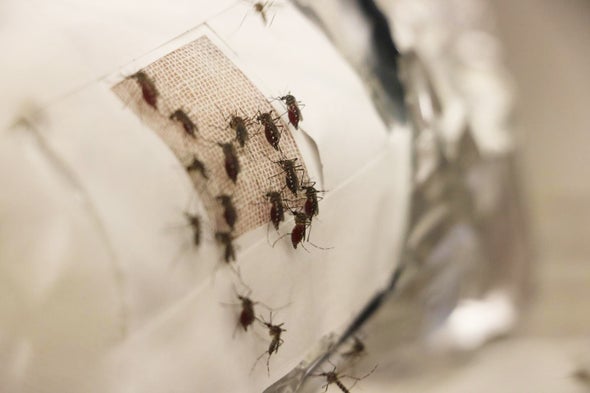(单词翻译:单击)
听力文本
This is Scientific American's 60-second Science, I'm Christopher Intagliata.
Mosquitoes are precision guided to their prey by plumes of carbon dioxide, heat and humidity. Sort of like how we follow our noses sometimes.
"It's like us passing a restaurant: we might look at the signs and we might look at the display case and might smell. It's a lot of things they do. They're very smart, unfortunately."
Robert Hurt, a chemical engineer at Brown University. As the skeeters get closer to us, he says, they also even smell and taste.
"They have gustatory receptors. They taste chemicals associated with your sweat. You have bacteria on your skin, the bacteria metabolize compounds in your sweat and the mosquitoes detect those."
You know what happens next. The bite. But Hurt and his colleagues have discovered a novel way to block them: with graphene, the substance composed of a single layer of carbon atoms.
Hurt and his team asked volunteers to stick their arms into a box full of mosquitoes. "We don't actually disclose who those research subjects were, but we were closely involved." In other words, he will neither confirm nor deny that he and his colleagues were subjects.

So whoever the subjects were, when they had no skin protection, the mosquitoes swarmed and bit the skin. However, with a graphene-based patch on the skin, the mosquitoes landed but seemed uninterested—and largely didn't bite. Hurt thinks that's because the film blocks those chemical cues the mosquitoes kind of "taste" on the skin. And when the film was dry, at least, it also physically blocked the mosquitoes from plunging their tiny hypodermic needles into the prospective victim.
The results are in the Proceedings of the National Academy of Sciences.
Mosquitoes could still sense the CO2 in your breath, of course. But when they get there, if you're wearing graphene, there wouldn't be too much to bite. And Hurt says the graphene film is cheap—just a few cents per square foot—and breathable. So if they can figure out how to keep the material mosquito-proof when moist, they'll be one step closer to graphene-laced antimosquito clothing.
So has Bill Gates called yet to see if this research could lead to another weapon against malaria? "He hasn't, you know. But he calls all the time anyway, so I'm always trying to put him off when they call. But if he does, I'll talk to him, yeah."
Thanks for listening for Scientific American — 60-Second Science. I'm Christopher Intagliata.
参考译文
这里是科学美国人——60秒科学系列,我是克里斯托弗·因塔格里塔。
蚊子凭借二氧化碳、热量和湿气的精准指引而定位猎物。有点像我们有时凭借气味找东西。
“这就像路过餐厅,我们可能会看到招牌、展示柜,还会闻到味道。蚊子会做很多事情。不幸的是,它们非常聪明。”
布朗大学的化学工程师罗伯特·赫特说到。他说,当蚊子靠近我们时,它们甚至会嗅闻和品尝味道。
“它们有味觉感受器。它们品尝与汗液有关的化学物质。你的皮肤上有细菌,这些细菌代谢你汗液中的化合物,蚊子能探测到这些物质。”
你知道接下来会发生什么。叮你。但是赫特和同事发现了一种阻止蚊子的新方法:石墨烯,这是由单层碳原子组成的物质。
赫特及其团队让志愿者将手臂伸进一个满是蚊子的盒子里。“我们没有透露研究对象是谁,但我们密切参与其中。”换句话说,就他和他的同事是否是研究对象而言,他既不确认也不否认。
因此,无论研究对象是谁,当他们没有皮肤保护措施时,蚊子就会蜂拥而来,叮咬皮肤。然而,在皮肤上贴上含有石墨烯的贴片后,蚊子会落在皮肤上,但似乎不感兴趣——基本上不会叮咬。赫特认为这是因为石墨烯薄膜阻挡了蚊子在皮肤上“品尝”的化学线索。当薄膜干燥时,至少也能在物理上阻止蚊子将其微型皮下注射针扎进潜在受害者体内。
研究结果发表在《美国国家科学院院报》上。
当然,蚊子仍能感觉到你呼吸中的二氧化碳。但当它们到达皮肤时,如果你穿着含有石墨烯的衣服,那就没有什么可咬的。赫特表示,石墨烯薄膜很便宜,每平方英尺只要几美分,而且非常透气。因此,如果他们能弄明白如何让这种材料在潮湿的状态下防蚊,那他们就离添加石墨烯的防蚊服更近了一步。
那比尔·盖茨有没有打电话来,看看这项研究能否带来另一种对抗疟疾的武器?“他没有。但不管怎么说,他总是在打电话,所以其他人打电话时,我只能稍后再打给他。但如果他打来电话,那我会和他谈谈的。”
谢谢大家收听科学美国人——60秒科学。我是克里斯托弗·因塔利亚塔。
译文为可可英语翻译,未经授权请勿转载!
重点讲解
重点讲解:
1. be composed of 组成;构成;
The force would be composed of troops from NATO countries.
这支军队将由来自北约国家的部队组成。
2. neither...nor... 既不…也不…;
Professor Hisamatsu spoke neither English nor German.
久松教授既不会讲英语,也不会讲德语。
3. lead to 招致;致使;导致;
People will accept suffering that can be shown to lead to a greater good.
如果能证明眼前的苦难会带来更大的好处,人们就会愿意承受。
4. put off 推迟;拖延;
Women who put off having a baby often make the best mothers.
晚育的女性经常会成为最优秀的母亲。


